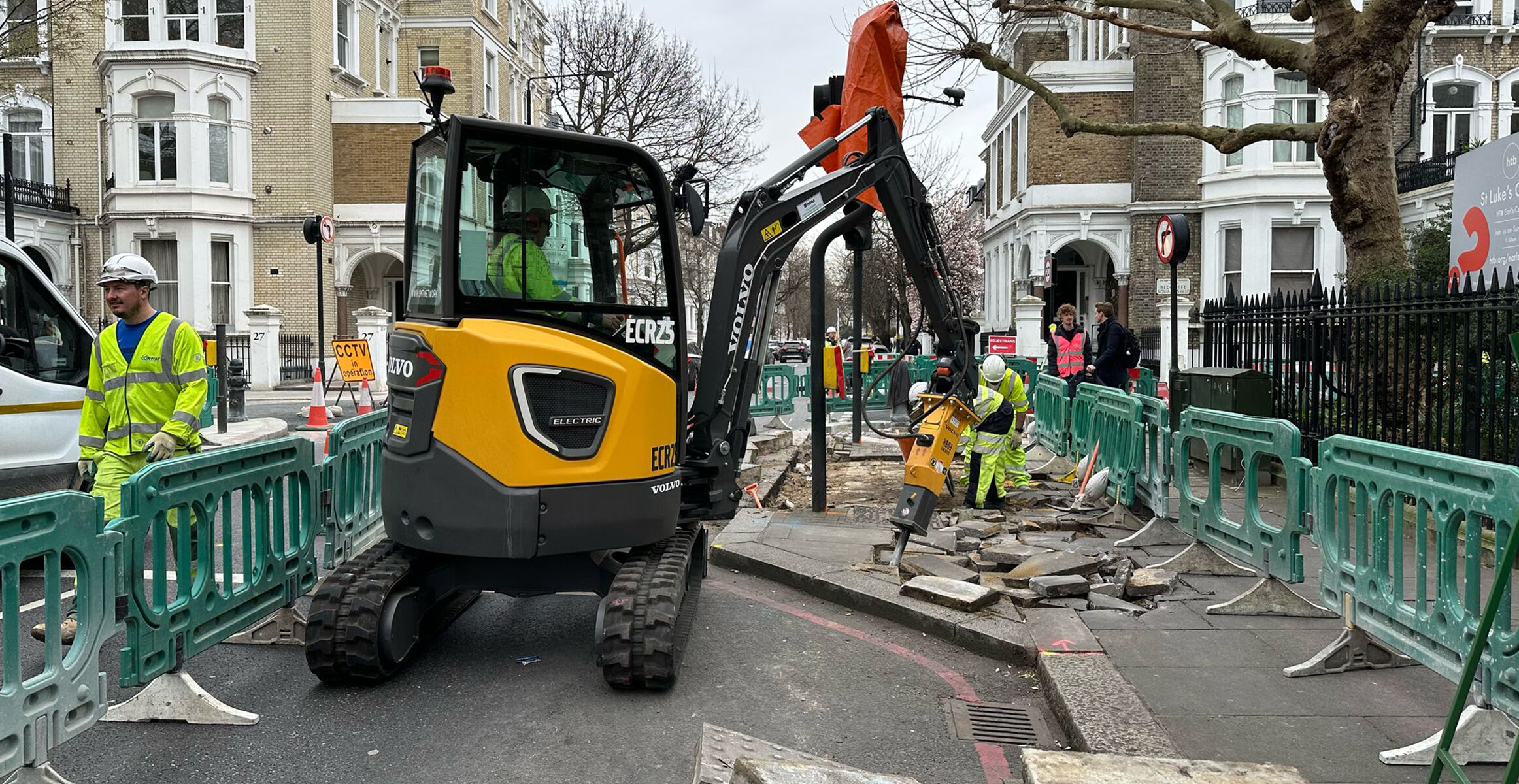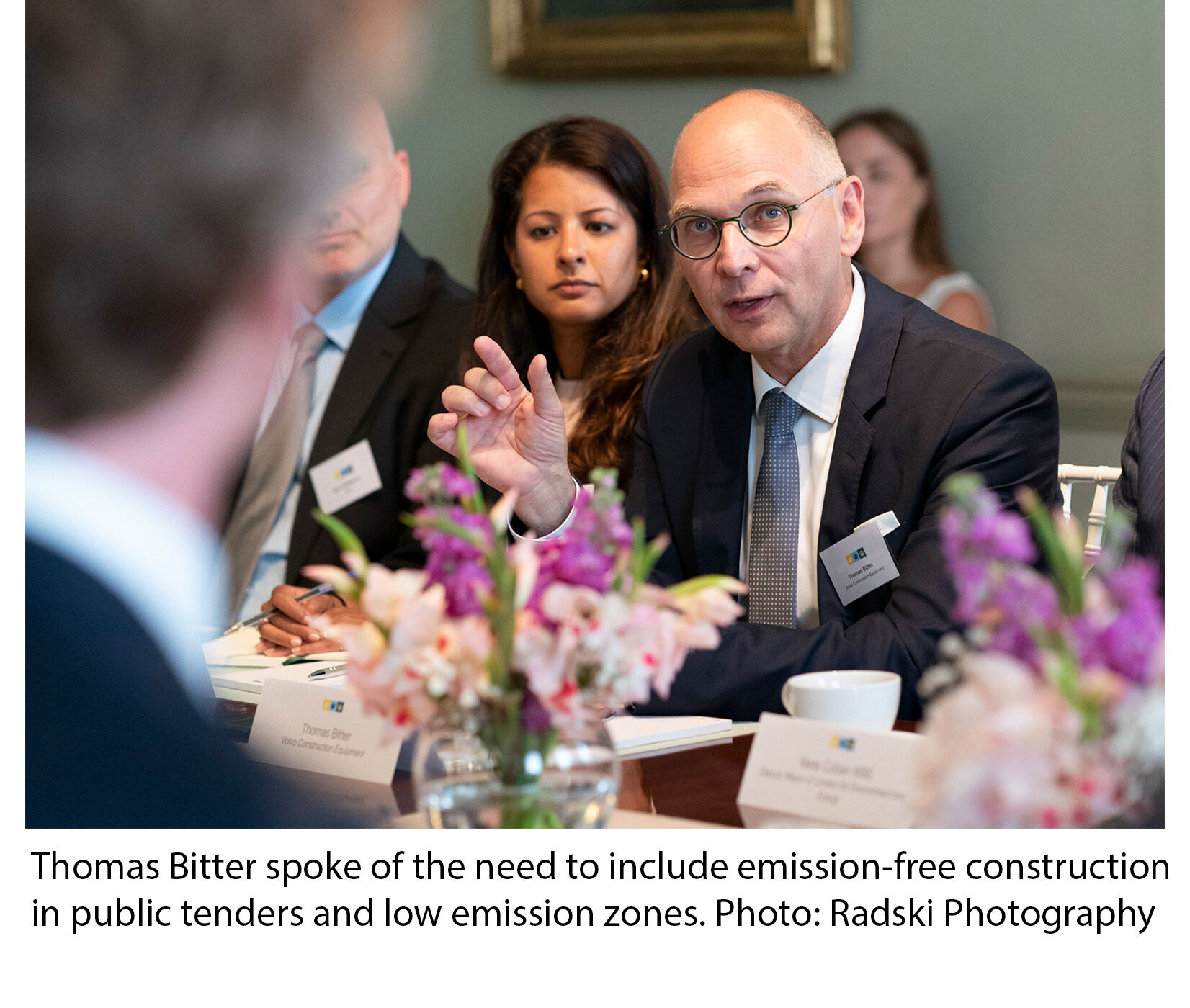Policy and industry join forces in London to tackle urban emissions from construction equipment
 Mete Coban MBE, Deputy Mayor of London (center) with Thomas Bitter, Head of the Compact Business Unit at Volvo CE (left) and His Excellency the Swedish Ambassador to the United Kingdom, Stefan Gullgren (right). Photo: Radski Photography
Mete Coban MBE, Deputy Mayor of London (center) with Thomas Bitter, Head of the Compact Business Unit at Volvo CE (left) and His Excellency the Swedish Ambassador to the United Kingdom, Stefan Gullgren (right). Photo: Radski Photography
During London Climate Action Week 2025, the Swedish Embassy, the Swedish Chamber of Commerce and Volvo CE gathered industry players, policy leaders and air quality advocates to address the urgent need to accelerate the shift to zero-emission construction equipment. The message was clear: air pollution is a huge public health issue that cannot be ignored.
Diesel compact machines, prevalent in cities, are a major contributor to the critical public health issue of air pollution yet are often exempt from low emission zone regulations. Collaboration is essential to ensure that the potential for zero-emission alternatives to significantly improve urban environments is not ignored. Stakeholders across the value chain gathered to share best practice and break down barriers to drive the urgently-needed shift to emission-free construction.
The high-level roundtable was held at the Swedish Embassy during London Climate Action Week in June and highlighted the positive impact that shifting to electric construction machines can have on improving urban air quality. Bringing together leaders from Volvo CE, the City of London and influential researchers and campaign groups, the event took advantage of the momentum from the annual festival to help accelerate a viable solution to poor air quality.
With construction now a dominant source of black carbon emissions in London – exceeding cars for the first time – there is an urgent need for bold leadership to drive change. The impassioned discussion at the roundtable underscored that inaction would be catastrophic.
Mete Coban MBE, Deputy Mayor for Environment and Energy, said: “Clean air is a matter of social justice, which is why the Mayor and I are doing everything we can to reduce toxic air pollution in our city. Reducing emissions from construction equipment is a key way we can clean up our air, and the Mayor has already taken firm action by introducing the Non-Road Mobile Machinery Low Emission Zone and tightening standards, ahead of all construction equipment in London needing to be zero-emission by 2040. By bringing industry leaders and partners together this London Climate Action Week, we can continue to collaborate on innovative solutions that improve our air quality and environment as we work to build a greener, healthier London for everyone.”
Rosamund Adoo-Kissi-Debrah CBE, Founder, Director, and Trustee of Ella Roberta Foundation, said: “We owe it to future generations to treat air pollution as the public health emergency it is. Meeting the WHO’s minimum standards must be the starting point — and I hope Ella’s Law remains front of mind as we work towards making the right to clean air a reality for all.”
 In London alone, the approximate 5,000 diesel compact excavators at work today emit as much harmful pollutants – of NOx (nitric oxide and nitrogen dioxide) and PM (particulate matter) – as over 100,000 diesel cars. However, these machines currently fall outside Ultra Low Emission Zone (ULEZ) restrictions.
In London alone, the approximate 5,000 diesel compact excavators at work today emit as much harmful pollutants – of NOx (nitric oxide and nitrogen dioxide) and PM (particulate matter) – as over 100,000 diesel cars. However, these machines currently fall outside Ultra Low Emission Zone (ULEZ) restrictions.
With recent statistics showing that only 17% of global cities comply with WHO air quality guidelines and air pollution is linked to 8.1 million premature deaths globally in 2021, the urgency for cleaner air in our cities has never been more evident.
Transitioning to electric-powered construction equipment would significantly reduce air and noise pollution. These machines – which produce zero tailpipe emissions and less vibrations, energy loss, and noise – offer undeniable benefits for densely populated areas, increasing the health and wellbeing of everyone around.
To fulfil their potential, however, it is crucial to accelerate infrastructure development, green energy supplies, policy support and cross-industry cooperation.
Thomas Bitter, Head of the Compact Business Unit at Volvo CE, noted: “Cities like London are making great progress to improve air quality. But ignoring construction equipment in low emission policies misses a key health opportunity. Zero-emission solutions exist, but adoption is too slow. We need full value chain collaboration to break down barriers to change and speed up the shift to emission-free construction that is so essential for urban health.”

The trial in Redcliffe Gardens, London, used an ECR25 Electric excavator to help remove nearly 8kg of NOx and NHMC emissions.
Fredrik Warneryd, CEO of the Swedish Chamber of Commerce for the UK (SCC UK), says: “At SCC UK, our purpose has always been to foster connections that spark innovation and drive positive growth. By helping to bring together the right partners, we are proud to support Swedish solutions addressing global challenges. Volvo CE’s leadership in advancing sustainable solutions and clean air sets a powerful example for the industry and beyond. It is through partnerships like these that we can drive meaningful progress together.”
Successful trial demonstrates potential to cut construction emissions
The roundtable also highlighted the results of an almost 12-week trial by Volvo CE, Transport for London (TfL) and contractor FM Conway, in which diesel machines were replaced by three zero-emission electric construction machines.
Because these electric alternatives produce zero NOx and PM emissions, the findings revealed that the trial had therefore removed nearly 8kg of NOx and NHMC (non-methane hydrocarbons) emissions from the streets. That is the same amount of NOx as would be pumped out from a diesel car travelling more than 39,000 miles (close to 63,000 km).
Diesel compact machines are disproportionately higher emitters because they are not required to be fitted with the same particulate filters that passenger cars and larger construction equipment are required to have. This is because bigger machines have historically been in greater focus than smaller ones when it comes to tackling air pollution. But in fact, while compact machines make up only around a third of construction equipment in Europe, they account for over 50% of the sector’s NOx emissions.
Scaling this solution to other cities worldwide could therefore transform the air quality of urban environments.
The roundtable concluded with an urgent call to action for cities around the world to break down barriers, open collaboration and develop similar initiatives. By addressing the often-overlooked impact of diesel compact machines on urban air quality, incorporating construction equipment into low emission zones and embedding sustainability criteria in public works, stakeholders can together shape healthier urban environments for all.


